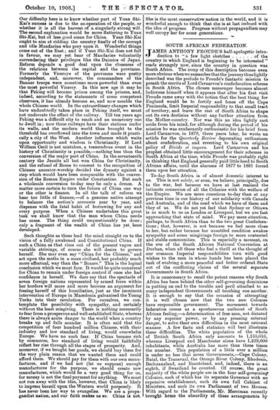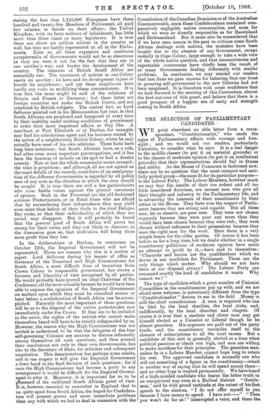SOUTH AFRICAN FEDERATION.
JAMES ANTHONY FROUDE'S half-apologetic intro- duction to " a few light sketches of the country in which England is beginning to be interested " reads strangely now, since the country in question was South Africa. The irony of this description becomes even more obvious when we remember that the journey thus lightly described was the prelude to Froude's fantastic mission to preach the merits of Lord Carnarvon's confederation scheme in South Africa. The chosen messenger becomes almost ludicrous himself when it appears that after his first visit Froude came away with the notion that the best thing for England would be to fortify and fence off the Cape Peninsula, limit Imperial responsibility to that small tract of territory, and leave the rest of South Africa to shape out its own destinies without any further attention from the Mother-country. Nor was this an idea lightly cast aside from his mind, for although during the period of his mission he was exuberantly enthusiastic for his brief from Lord Carnarvon, in 1879, three years later, he wrote an article for the Quarterly Review deprecating enthusiasm about confederation, and reverting to his own original policy of Divide et impera. Lord Carnarvon and his prophet obtained little encouragement for their schemes iu South Africa at the time, while Froude was probably right in thinking that England generally paid little heed to South African affairs, until the alarums of 1877 to 1881 forced them upon her attention.
To-day South Africa is of almost domestic interest to us. This is not solely, or even, we believe, principally, due to the war, but because we have at last realised the intimate connexion of all the Colonies with the welfare of the Empire. We are more conscious to-day than at any previous time in our history of our solidarity with Canada and Australia, and of the need which we have of them and they of us. We do not yet feel that Sydney or Ottawa is as much to us as London or Liverpool, but we are fast approaching that state of mind. We pay more attention, perhaps, to South Africa than to the two great Confedera- tions ; that, however, is not because we feel more close to her, but rather because her unsettled condition awakes sympathy and some misgivings foreign to more contented and stable communities. This is especially a. moment, on the eve of the South African National Convention at Durban, when all those who feel a thrill at the thought of our common Imperial responsibilities turn with good wishes to the men in whose bands has been placed the task of evolving a more peaceful and better ordered State out of the conflicting claims of the several separate Governments in South Africa.
It is unnecessary to recall the patent reasons why South Africa has been behind the other self-governing dominions in putting an end to the trouble and peril attached to so many independent Governments all touching one another. It is enough to say that the occasion of attempting it is well chosen now that the two new Colonies have responsible government. The movement towards federation comes as a spontaneous outburst of South African feeling,—a determination of free men, not dictated by any superior power, or by any pressing external danger, to solve their own difficulties in the most rational manner. A few facts and statistics will best illustrate . these difficulties. The white population of the whole of British South Africa only amounts to 1,135,01.6, whereas Liverpool and Manchester alone have 1,229,000 inhabitants, while Australia has more than three times the number. This population of a little over a million is under no less that seven Governmeuts,—Cape Colony, Natal, the Transvaal, the Orange River Colony, Rhodesia, Bechuanaland, and Basutoland, and, indeed, there is an eighth, if Swaziland be counted. Of course, the great majority of the white people are in the four self-governing& Colonies, each of which has its separate Governor with an expensive establishment, each its own full Cabinet of Ministers, and each its own Parliament of two Houses. With regard to the Parliaments, Mr. Merriman recently brought home the absurdity of these arrangements by stating the fact that 1,125,000 Europeans have three hundred and twenty-five Members of Parliament, all paid fair salaries, to decide ou their affairs ; the United Kingdom, with its forty millions of inhabitants, has little more than three times as many legislators. It is true there are about six million natives in the country as well, but they are hardly represented at all in the Parlia- ments. - Even so, all these expensive and cumbrous paraphernalia of Governments would not be so obnoxious as they are were it not for the fact that they are in one another's way, and hinder the development of the country. The interests of British South Africa are essentially one. The treatment of natives in one Colony reacts on another ; its laws and its development injure or benefit its neighbours ; and yet these neighbours have hardly any voice in modifying these circumstances. It is true that the same might be said of the relations of Britain and France or Germany ; but these latter are foreign countries not under the British Crown, and not inhabited by British subjects. The central fact, as Lord Selborne pointed' out in his Memorandum last year, is that South Africans are perplexed and hampered at every turn by their inability under existing conditions of government to order their most important affairs as they like. A merchant at Port Elizabeth or at Durban, for example, may find his calculations upset and his business ruined by the action of a neighbouring British Colony, where he may actually have most of his own relations. These facts have long been notorious ; but South Africans have, as a rule, had other even more important preoccupations, and it has been the business of nobody on the spot to find a drastic remedy. Now at last the whole community seems aroused ; the time is propitious ; and although all are not agreed on the exact details of the remedy, some form of an amalgama- tion of the different Governments is regarded by all public men of any note as the direction in which the cure should be sought. It is true there are still a few particularists who raise feeble voices against the general consensus of opinion. Such in the Transvaal are the old-fashioned extreme Protectionists, or in Natal those who are afraid that by surrendering their independence they may yield even more than before of their trade to the rival Delagoo. Bay route, or that their individuality, of which they are proud, may disappear. But it will probably be found that the general good of South Africa will prove too strong for their views, and they are likely to discover, as the discussion goes on, that unification will bring them more profit than they lose.
In the deliberations at Durban, to commence on October 12th, the Imperial Government will not be represented. There are reasons why this is a matter of regret. Lord Selborue during his tenure of office as Governor of the Transvaal and High Commissioner for South Africa, a most difficult time of transition from Crown Colony to responsible government, has shown a fairness and liberality of view recognised by all parties. He would probably have proved an ideal Chairman of the Conference, all the more valuable because he would have been able to express the opinions of the Imperial Government on matters upon which they must be consulted sooner or later before a confederation of South Africa can be accom- plished. Naturally the most important of these questions will be as to the disposal of the native protectorates now immediately under the Crown. If they are to be included in the union, the rights of the natives who cannot make themselves heard will have to be strictly safeguarded by us. However, the reason why the High Commissioner was not invited is understood to be that the delegates of the four self-governing Colonies are anxious to discuss informally among themselves all such questions, and then present their conclusions not only to their own Governments, but also to the Secretary of State, for criticism and subsequent negotiation. This determination has perhaps some merits, and in one respect it will give the Imperial Government a freer hand in the final decision of such questions ; for if once the High Commissioner had become a party to any arrangement it would be difficult for the Imperial Govern- ment to alter it. Moreover, it is important for us to be Assessed of the undiluted South African point of view. It is, however, essential to remember in England that to us, quite apart from South Africa, the hoped-for Confedera- tion will present graver and more immediate problems than any with which we bad to deal in connexion with the Constitution of the Canadian Dominion or of the Australian Commonwealth, since these Confederations contained com- paratively negligible native communities, and none for which we were so directly responsible as for Basutoland and Bechuanaland. But it must also be remembered that if we have seen reason in the past to criticise some South African dealings with natives, the mistakes have been largely due to the absence of any Government, except recently in Cape Colony, large enough to take a wide view of the whole native question, and that inconsistencies and regrettable occurrences have chiefly been the result of so many Governments dealing differently with similar problems. In conclusion, we may remind our readers that last June we gave reasons for believing that our trust in granting self-government to the new Colonies had not been misplaced. It is therefore with some confidence that we look forward to the meeting of this Convention, almost the first outcome of this grant, and. believe that there is a good prospect of a happier era of unity and strength coming to South Africa.















































 Previous page
Previous page